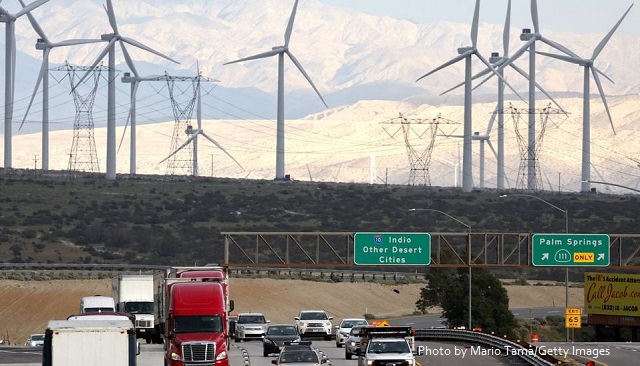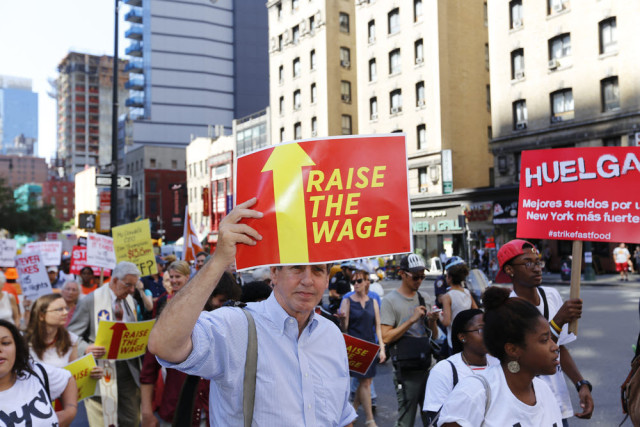Blue States Are Stripping Rural Counties Of Ability To Prevent Green Energy Takeover Of Their Communities

Several blue states have deprived rural counties of the ability to reject the massive green energy projects that corporations want to site in their communities, while green industrial interests and environmentalist groups have poured money into state capitals.
Michigan, California, New York and Illinois have all passed legislation that consolidates authority over land use issues and rules with state-level bureaucrats at the expense of local governments that could have altered their own zoning codes to stem the tide of industrial green projects like solar and wind farms. These policies deprive rural residents in these states of their freedom and local autonomy, while also benefiting the corporate interests that line the pockets of the states’ Democratic governors, state policy experts and lawmakers told the Daily Caller News Foundation.
“Much of the renewables business and movement has been co-opted by big corporations,” which “are spending millions” on politics “because this is a matter of billions for them,” Edward Ring, a senior fellow for the California Policy Institute and the organization’s co-founder, told the DCNF. “What we are seeing, for example, with the ‘Inflation Reduction Act,’ is one of the biggest gifts of money to corporations that we have ever seen in this country,” Ring told the DCNF, referring to the IRA’s subsidies facilitating the rise of green energy.
Since 2020, there have been about 350 local restrictions or rejections of solar and wind projects across the country, according to energy expert Robert Bryce’s Renewable Rejection Database.
In a shock to climate activists only, “green” energy is completely unreliable https://t.co/p7E9mD7JgD
— Daily Caller (@DailyCaller) December 30, 2022
Michigan
Democratic Michigan Gov. Gretchen Whitmer recently enacted her state’s green energy mandate, which sets a target for 100% green energy generation by 2040. The legislation has the state poised to significantly ramp up construction of solar and wind developments, as well as carbon capture pipelines that will be needed for the state’s natural gas plants to continue to operate in the future.
One of the bills Whitmer signed into law as part of the package, H.B. 5120, specifically allows the Michigan Public Services Commission, the state’s utility regulatory body overseen by officials appointed by the governor, to exercise permitting authority for large green energy projects rather than leaving zoning discretion to the municipal governments. Several local opposition campaigns in more rural locales across the state were able to hinder major green energy developments in their communities, but the new law could make similar grassroots success in the future effectively impossible.
Whitmer’s green energy package and the siting bill “very clearly advance the interests of monopoly utilities, big wind and solar developers and extreme environmental groups over the interests of local communities and rural Michiganders,” Jason Hayes, the director of energy and environmental policy for the Mackinac Center, a Michigan-based think tank, told the DCNF. “Put another way, these bills protect the profits of politically favored and heavily subsidized wind and solar developers, while sacrificing the rights and interests of the communities that will have to endure the wind turbines and solar arrays developers want to build… rural Michiganders will have to endure both the rising costs and the intrusions into their lives and environment as massive increases in wind and solar development begin to occur.”
A nonprofit organization linked to DTE Energy, a major utility company that Hayes told the DCNF stands to gain from the state’s green energy mandate, shelled out $2 million to help Michigan Democrats in 2022, according to The Detroit News. DTE Energy also gave $400,185 to organizations that spent, directly or indirectly, on Whitmer’s behalf before and after her victory in the 2018 gubernatorial race, according to the Michigan Capitol Confidential.
While DTE Energy also gives money to Republicans, Democrats received substantially more from the company in 2018 and 2022, according to the Michigan Capitol Confidential and The Detroit News.
Additionally, since 2021, Whitmer-affiliated political funds have raked in more than $100,000 in campaign cash from environmentalist organizations that support the green energy transition, like 314 Action and the Michigan League of Conservation Voters’ political action committee, according to state campaign finance records.
“Gov. Whitmer and Lansing Democrats are ignoring the concerns of Michigan families and forcibly imposing massive wind and solar projects on communities who have clearly stated that they do not want them,” Republican Michigan State Rep. Jaime Green, who represents a rural district and serves in Michigan’s House Energy, Communications and Technology Committee, told the DCNF. “Gov. Whitmer has sent a clear message: If there’s a disagreement between what local people want and what the environmental lobby wants, she’s siding with the lobbyists.”
While not directly related to the state’s consolidation of siting and permitting authority, the reaction of locals in rural Green Charter Township to a China-tied electric vehicle battery component manufacturer’s plans to set up shop in their community shows that local residents and state officials do not always agree on what is best for a given community. Whitmer, fellow Democrats and green energy advocates hailed Gotion’s plans to build subsidized facilities in the area as a major step forward for Michigan’s green economy, but many locals did not approve of the company because of its extensive connections to the Chinese Communist Party via its parent company, Gotion High-Tech.
Voters punished local officials who had supported the company in November at the ballot box, ousting five members of the township’s council, the township’s clerk and the township’s treasurer. Those officials had overseen and facilitated Gotion’s plans to operate in the area before their removal.
California
California, another state dominated by the Democratic Party, passed a law in June 2022 that enables state bureaucrats to bypass local restrictions in order to permit large-scale green energy projects. Similar to Michigan’s newly-enacted statute, the California law is specifically designed to facilitate the state’s pursuit of 100% zero-carbon energy generation by 2045.
“The Democratic lawmakers themselves, along with a lot of Republicans even in red states, are just getting so much money from these companies,” Ring told the DCNF regarding the green energy lobby’s influence in politics. “There is a reason we have eminent domain for some purposes, such as building pipelines and streets. Now, we have an abuse of eminent domain, and also an overriding of zoning—the problem is when you use it for something that relies on hype, without a proven and compelling public interest,” like fast-tracking solar and wind projects that often harm the environment while providing unreliable, intermittent power, Ring added.
Like Whitmer, Democratic California Gov. Gavin Newsom, a self-proclaimed environmentalist, has received considerable financial support from interests that ostensibly stand to benefit from a rapid buildout of green energy projects in the state. Between his 2018 and 2022 gubernatorial campaigns, Newsom received more than $340,000 from green energy trade groups, political action committees and executives, according to state campaign finance records reviewed by the DCNF.
“There is nothing wrong with being an environmentalist, per se. The issue is that the environmentalist movement has been hijacked by corporate interests,” Ring told the DCNF.
New York
New York state established the Office for Renewable Energy Siting (ORES) in April 2020, when former Democratic Gov. Andrew Cuomo was still in office before he resigned amid sexual harassment and COVID-19 scandals. ORES has the ability to not apply “any local law or ordinance” that is “unreasonably burdensome” for a proposed green energy facility in view of the state’s aggressive green energy goals or the perceived environmental benefits associated with a given project, according to the enabling statute’s text.
The bulk of new solar and wind projects are sited in upstate New York, a more rural region of the state that already receives most of its energy from carbon-free generation sources, Ken Girardin, the New York-based Empire Center’s research director, told the DCNF, citing data from the New York Independent System Operator.
“New York’s land-use policies and practices are far from perfect, but these are projects that wouldn’t be coming to areas if it weren’t for considerable public subsidies,” Girardin told the DCNF.
Cuomo and his successor, Democratic New York Gov. Kathy Hochul, each received considerable contributions from interest groups that ostensibly stand to gain from a green energy transition in the state. Green energy companies, trade groups and executives, as well as relevant unions and their political action committees, have contributed about $270,000 combined to the two politicians since 2018, according to state campaign finance records reviewed by the DCNF.
Unions are a major political force in the state, and they ostensibly could benefit from the scale of the many projects that will need to be built in order to meet the state’s longer-term green energy targets, Girardin told the DCNF.
Illinois
In February, Democratic Illinois Gov. J.B. Pritzker enacted H.B. 4412, which “prevents counties from enacting preemptive local ordinances that outright ban local wind and solar projects, hindering the state’s new climate goals.” Illinois is aiming to reach 100% green energy generation by 2050, and will need to build out a significant network of new solar and wind projects to get there.
“These new energy companies, many of which are owned by large, out-of-state venture capital firms receiving massive tax breaks, are now able to remove local control against the wishes of the community,” Republican Illinois State Sen. Terri Bryant told the DCNF about the policy. “This bill is especially dangerous in heavily agriculture counties that have limited zoning and large spaces of land used for crops… removing local control in favor of new energy companies, many of which are out of state and out of the country, is not just a threat to property rights, but to our national security and food supply chain.”
In his two terms as governor, Pritzker has pursued left-wing policies in numerous policy arenas, including imposing tight gun control measures, a $15 minimum wage and eliminating cash bail requirements for suspected criminals. These policies align with the left-wing agenda promulgated by other members of his family, one of the wealthiest in the country, according to the New York Post.
The offices of Whitmer, Newsom, Hochul and Pritzker did not respond immediately to requests for comment.
AUTHOR
NICK POPE
Contributor.
RELATED ARTICLES:
‘Made-Up Numbers’: Whitmer Misstates Key Stat From Study While Selling Her Green Energy Legislation
This Populous Blue State Has A Green Energy Mandate. Experts Say It Threatens Grid Reliability
EDITORS NOTE: This Daily Caller column is republished with permission. ©All rights reserved.
All content created by the Daily Caller News Foundation, an independent and nonpartisan newswire service, is available without charge to any legitimate news publisher that can provide a large audience. All republished articles must include our logo, our reporter’s byline and their DCNF affiliation. For any questions about our guidelines or partnering with us, please contact licensing@dailycallernewsfoundation.org.




